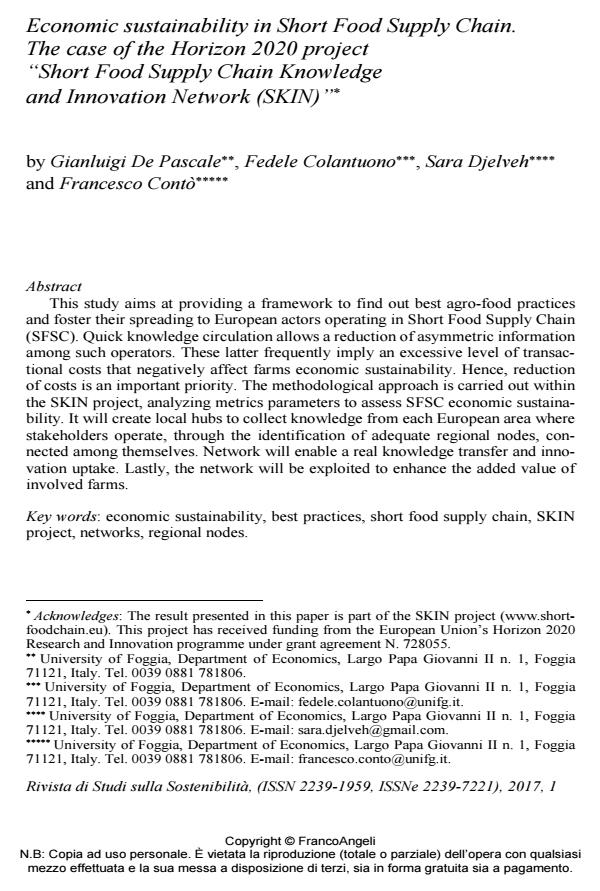Economic sustainability in Short Food Supply Chain. The case of the Horizon 2020 project "Short Food Supply Chain Knowledge and Innovation Network (SKIN)"
Journal title RIVISTA DI STUDI SULLA SOSTENIBILITA'
Author/s Gianluigi De Pascale, Fedele Colantuono, Sara Djelveh, Francesco Contò
Publishing Year 2017 Issue 2017/1
Language English Pages 13 P. 169-181 File size 210 KB
DOI 10.3280/RISS2017-001011
DOI is like a bar code for intellectual property: to have more infomation
click here

FrancoAngeli is member of Publishers International Linking Association, Inc (PILA), a not-for-profit association which run the CrossRef service enabling links to and from online scholarly content.
This study aims at providing a framework to find out best agro-food practices and foster their spreading to European actors operating in Short Food Supply Chain (SFSC). Quick knowledge circulation allows a reduction of asymmetric information among such operators. These latter frequently imply an excessive level of transactional costs that negatively affect farms economic sustainability. Hence, reduction of costs is an important priority. The methodological approach is carried out within the SKIN project, analyzing metrics parameters to assess SFSC economic sustainability. It will create local hubs to collect knowledge from each European area where stakeholders operate, through the identification of adequate regional nodes, connected among themselves. Network will enable a real knowledge transfer and innovation uptake. Lastly, the network will be exploited to enhance the added value of involved farms.
Keywords: Economic sustainability, best practices, short food supply chain, SKIN project, networks, regional nodes.
- Evolución y tendencias de la investigación científica en circuitos cortos de comercialización: análisis bibliométrico internacional. Jessica Geraldine Villatoro Hernandez, Monserrat Vidal Álvarez, Ariel Vázquez Elorza, in Agricultura, Sociedad y Desarrollo /2023
DOI: 10.22231/asyd.v20i2.1522 - Directions for Ensuring the Equivalence of Exchange in Agri-Food Chains in Ukraine Olha.O. Varchenko, in Visegrad Journal on Bioeconomy and Sustainable Development /2021 pp.29
DOI: 10.2478/vjbsd-2021-0007 - Consumers’ Willingness to Pay for Agri-Food Products Delivered with Electric Vehicles in the Short Supply Chains Antonino Galati, Giuseppina Migliore, Alkis Thrassou, Giorgio Schifani, Giuseppina Rizzo, Nino Adamashvili, Maria Crescimanno, in FIIB Business Review /2023 pp.193
DOI: 10.1177/23197145221112743
Gianluigi De Pascale, Fedele Colantuono, Sara Djelveh, Francesco Contò, Economic sustainability in Short Food Supply Chain. The case of the Horizon 2020 project "Short Food Supply Chain Knowledge and Innovation Network (SKIN)" in "RIVISTA DI STUDI SULLA SOSTENIBILITA'" 1/2017, pp 169-181, DOI: 10.3280/RISS2017-001011